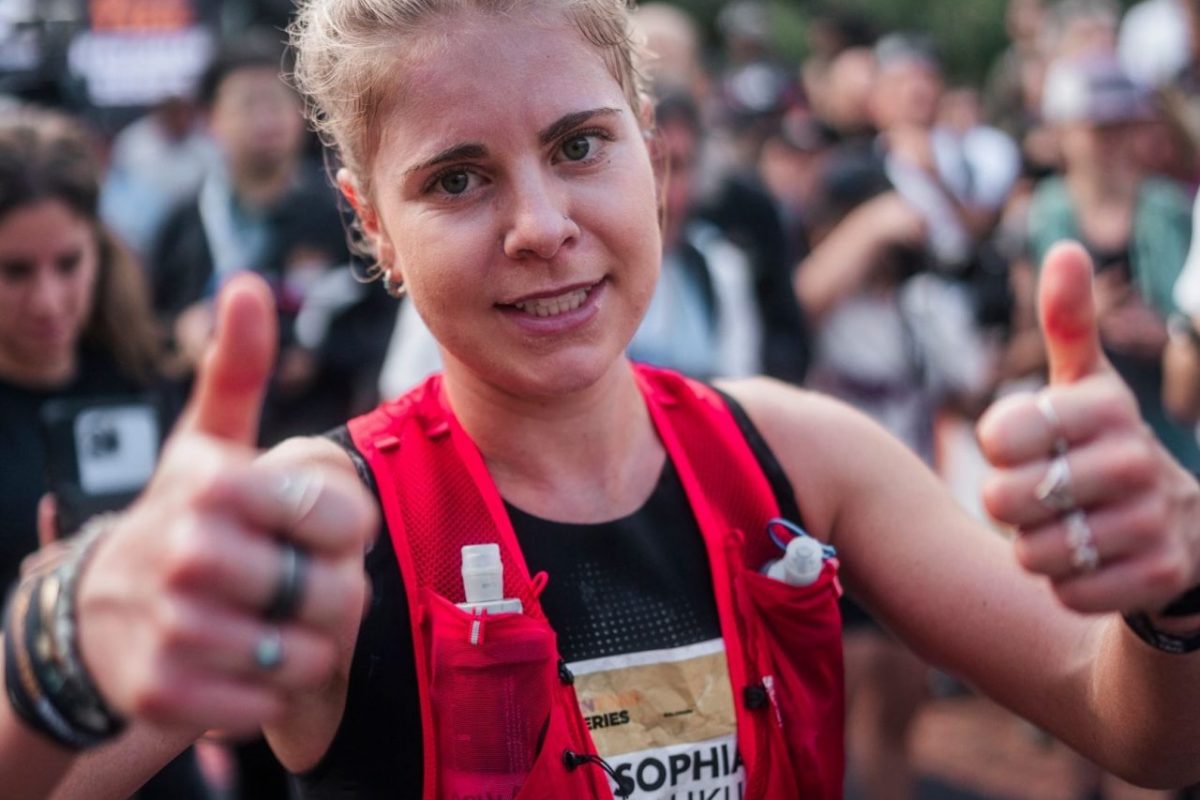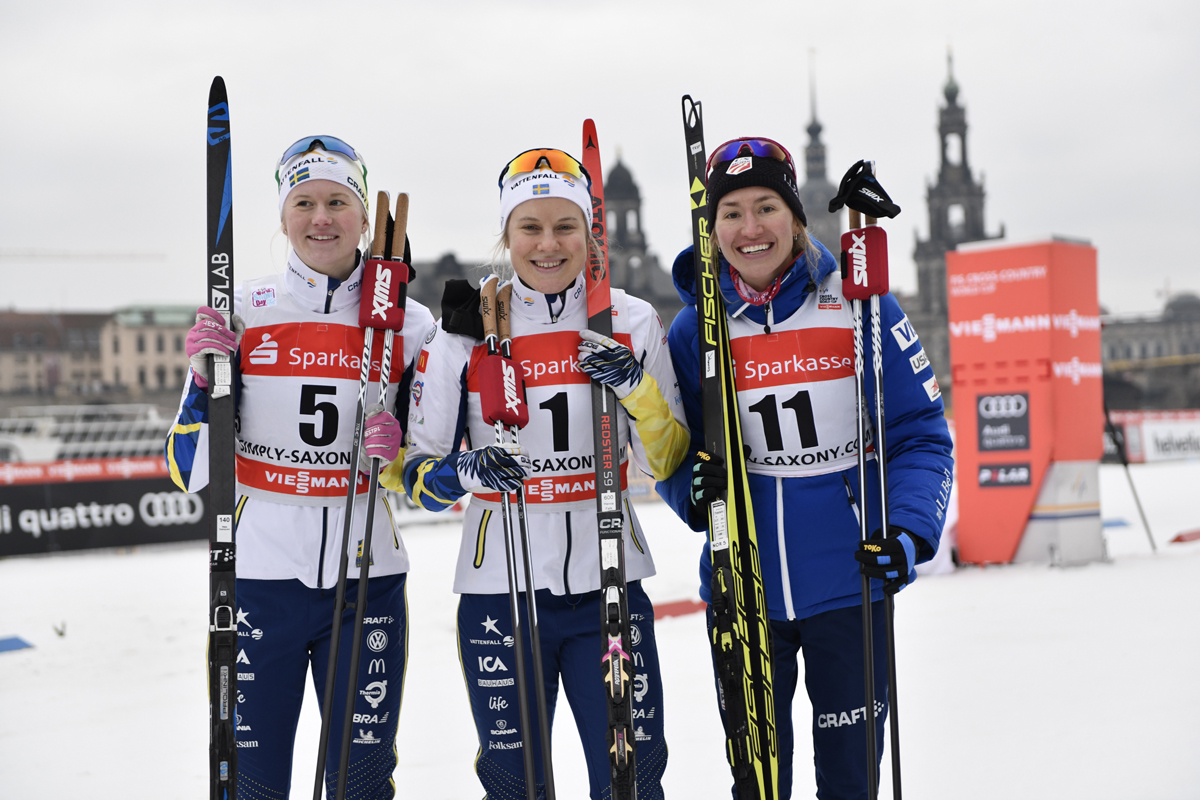
In Sophie Caldwell’s quarterfinal heat of the World Cup skate sprint in Dresden, Germany, she led from start nearly to finish. In the final 200 meters she was passed by Sweden’s Hanna Falk, but won a photo finish for second place and advanced to the semifinals.
In that quarterfinal heat, the U.S. Ski Team member had finished just 0.24 seconds behind Sweden’s Falk.
As the racing got even tighter in the semifinals and final, it became more difficult to shoot off the starting line and into first place. Caldwell spent much of those heats boxed in the middle or even the back of her six-woman heats, partly on purpose, but advanced to the final as a “lucky loser” anyway.
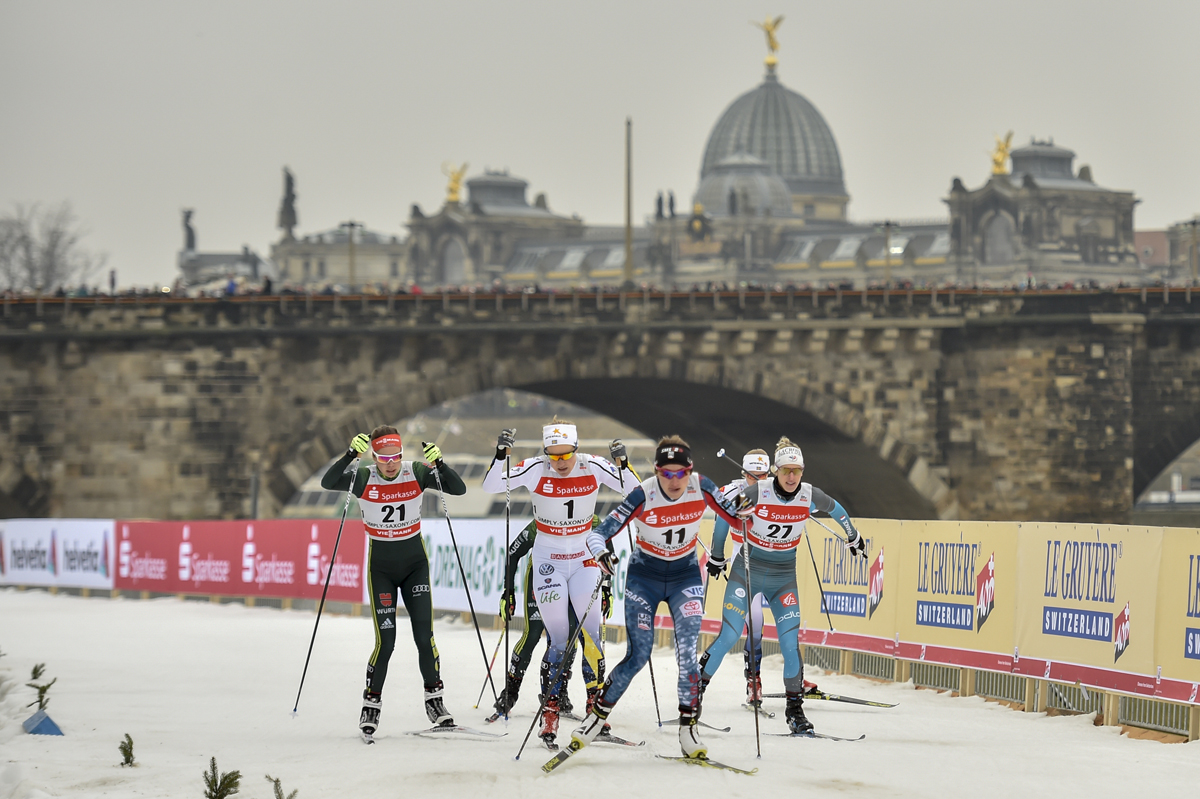
“Sophie really executed the way she wanted to all day,” U.S. Ski Team Head Coach Chris Grover said. “She was in control of her quarterfinal, and then when she got to the semifinal, she purposely wanted to relax a little bit… same thing in the final. She was not going to, like, burn a match early. She was going to relax, be in the draft, save a little bit of energy early, and look to make a move.”
By the end of the final, despite skiing from the back instead of the front, Caldwell’s margin to Falk was almost the same as it had been in the quarterfinal, this time 0.30 seconds.
Falk took the win while Caldwell finished third, earning her second podium of the year.
“It was pretty frantic, and in the final I didn’t have a great start,” Caldwell said. “I found myself in the back and it’s easy to waste a lot of energy being in the back and trying to move up, so I tried to be patient and pick people off when I could. But you also kind of have to capitalize on those opportunities when they come, so I just tried to be patient and pick people off. There was a fall that I dodged, which worked to my advantage, and so I am really happy with it.”
The crash belonged to Sweden’s Stina Nilsson, the favorite to win the final even though Falk had the fastest qualifying time. Near the end of the race loop Nilsson tripped and went down, with Caldwell and Switzerland’s Laurien van der Graaf splitting to go around her, one of each side.
“The crash happened right in front of me,” Caldwell said in a U.S. Ski & Snowboard press release. “But I managed to avoid it and then put in a big push to maintain contact with the leaders.”
That liberated Caldwell from the back of the field, although she still had work to do to get near the front. From the beginning of the heat, Falk, Nilsson, and Swedish teammates Anna Dyvik and Maja Dahlqvist had controlled the pace.
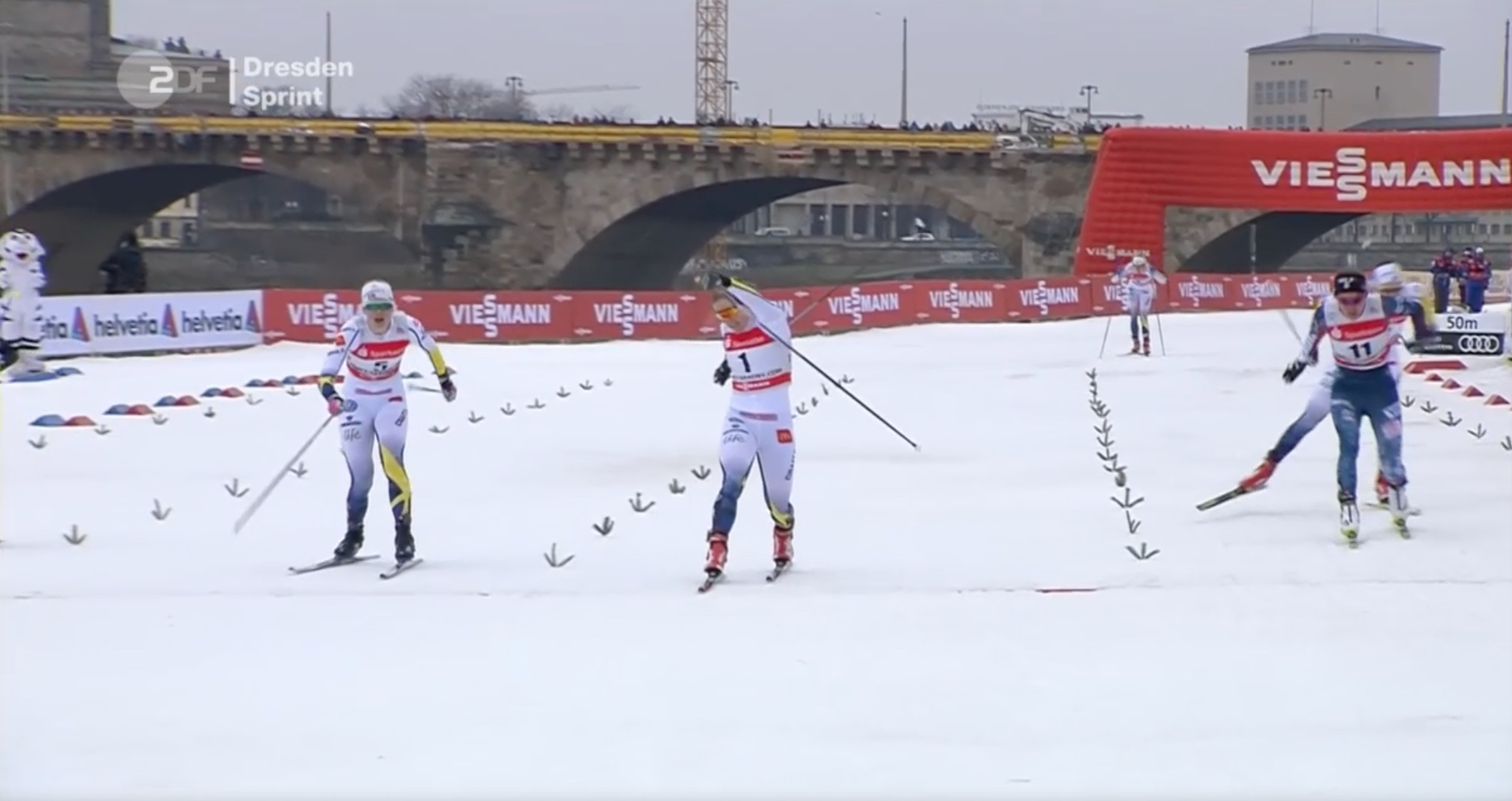
As the meters ticked down to the finish, Caldwell finally was able inch towards the lead.
“Where she ended up making that move, under the bridge, was a targeted strategy of hers,” Grover said.
Coming into the finish, everyone except Nilsson was still in it, and the five women all crossed the line within 0.68 seconds of one another. Falk, though, managed to stay clear of the pack and take her first win since 2010.
“I think I was a little unfocused in the start in the semifinal, so in the final I really tried to focus on the start,” she said in a finish-line interview with FIS’s Jeff Ellis. “Then I took the front, and it was just to push hard… I really like this kind of city sprint. It was a good day for me. I have all my family and fans from Ulricehamn here cheering for me here, so it was a good day.”
Dahlqvist claimed second (0.23), van der Graaf fourth (+0.58), and Dyvik fifth.

While pursuing a completely different strategy from Falk in the final, Caldwell proved that there are many ways to the right position, as long as you play your cards right.
“I am really psyched to be here,” Caldwell said. “ I’ve never had great results in Period 1 in the past, so I was really happy to have made the semifinals in all three of the sprints. I considered it a really strong start, but I was left wanting more.”
She is following up a second-place finish in the skate sprint in Lenzerheide, Switzerland, which kicked off the Tour de Ski. But Caldwell fell ill partway through the Tour, and didn’t start the (later-canceled) classic sprint in Oberstdorf, Germany.
“I woke up sick the morning of the sprint in Oberstdorf, so I was sick for a week,” she explained. “I am actually still clearing things out, but energy-wise I felt good the past few days. Today was going kind of be a test to see how I felt, and I guess I was well rested. It felt good.”
She is now third in the Sprint Cup behind Nilsson and Norway’s Maiken Caspersen Falla, who did not race in Dresden.
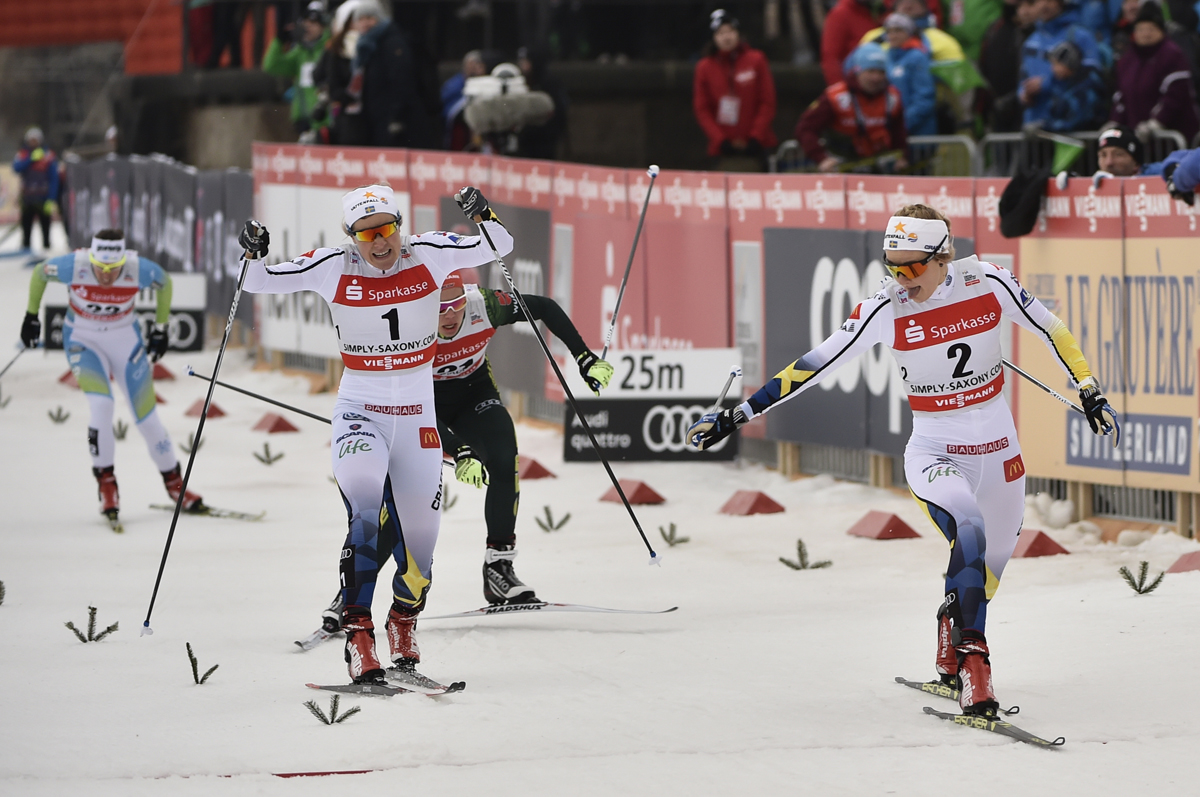
City sprints aren’t so unusual; they have been held in Drammen, Norway, for many years straight, with other venues like Stockholm, Dusseldorf, Milan, and Quebec City coming and going from the schedule.
But even for a city sprint, this course was particularly flat, short, and fast, which played to some athletes’ strengths and left others just trying to do their best to get by.
“It was a really funny course a lot different than anything we have ever done — by far the shortest I have ever done and flattest,” Caldwell said.
Her American teammate Ida Sargent qualified in 14th position, a new experience on such a course.
“It’s a weird course,” she said. “It’s fast and flat. Not at all my favorite kind of sprint race. I just went into it looking at it as a challenge and an opportunity to improve on some of the things that are not really my strengths. So I’m pretty psyched with the qualifier to be right up there, on a course where I feel like a year or two ago I definitely wouldn’t have qualified on. That was exciting.”
Like Caldwell, Sargent led out her quarterfinal heat. And like Caldwell, she got swept up at the end of it, with her competitors using a small uphill and a subsequent downhill to shoot into the finishing straights. She couldn’t hang on to the top two and finished fourth in the heat, 0.43 seconds behind Sweden’s Ida Ingemarsdotter.
That put her 17th on the day.
“Coming into the finish, it was pretty fast and I wasn’t quite ready for that,” she said. “I should have switched to V2 sooner, and I felt like it was all over the place. So I’m kind of kicking myself.”
“Ida had a great start, took control, skiing how she wanted to ski, just ran out of gas at the end,” Grover said. “And I think it was a course where there’s no rest, it’s continuous effort – if V2’ing hard, V2 alternate-ing hard, if that isn’t your deal, then you could run out of gas at the end.”
Both Sargent and Caldwell thought it was important to start well on this course, even though in the semifinal and final Caldwell managed to succeed without ever leading.
“It’s really narrow and hard to pass,” Caldwell said. “It was pretty easy to sense when people were coming up, so I think people were guarding their space. That made it even harder to pass. When I was leading my quarterfinal I got to do some of that, and then when I wasn’t leading it was frustrating sometimes — you would see people bouncing around out there trying to make moves.”
“There’s room to move up, but it’s definitely big decisive moves,” Sargent agreed. “I just got out fast [in the quarterfinal] and tried to stay in my rhythm at the beginning. I could feel the others coming up and I would just try to increase the pace whenever I could feel someone coming up so I could keep control.”
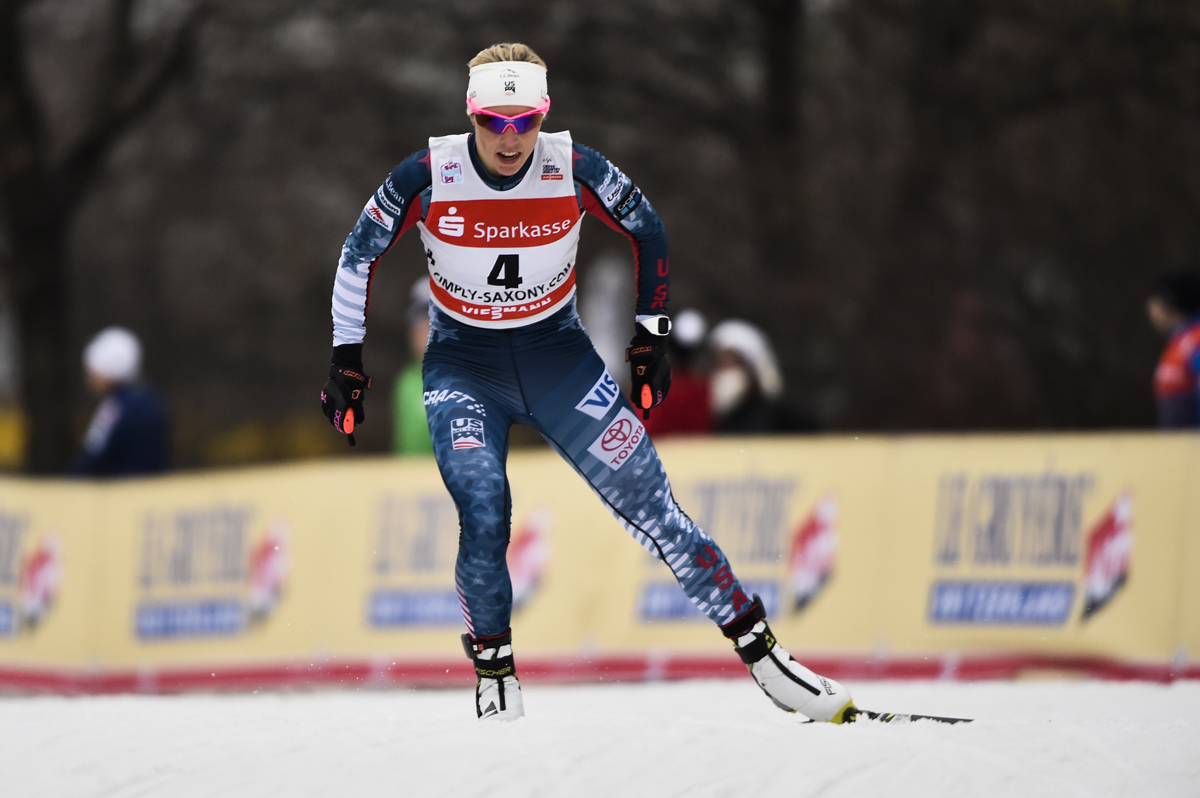
Also starting for the U.S., Kikkan Randall narrowly missed qualifying for the quarterfinals in 34th, 6.57 seconds behind Falk’s time and 0.6 seconds behind 30th-place Giulia Stuerz of Italy.
Randall, Caldwell, and Sargent are now looking forward to the Olympic Games, which begin in less than a month. Sargent sealed her qualification with that 17th-place finish, as she is now ranked 13th in the Sprint Cup, well within the top-50 designation required by the U.S. Ski Team.
“I am looking forward to the Olympics,” Caldwell said in a post-race press conference. “It has been a strong year for me, and especially for my whole team. We are going to compete as a team to win the first medal for the U.S. women in Olympics, and I am proud to be on the team.”
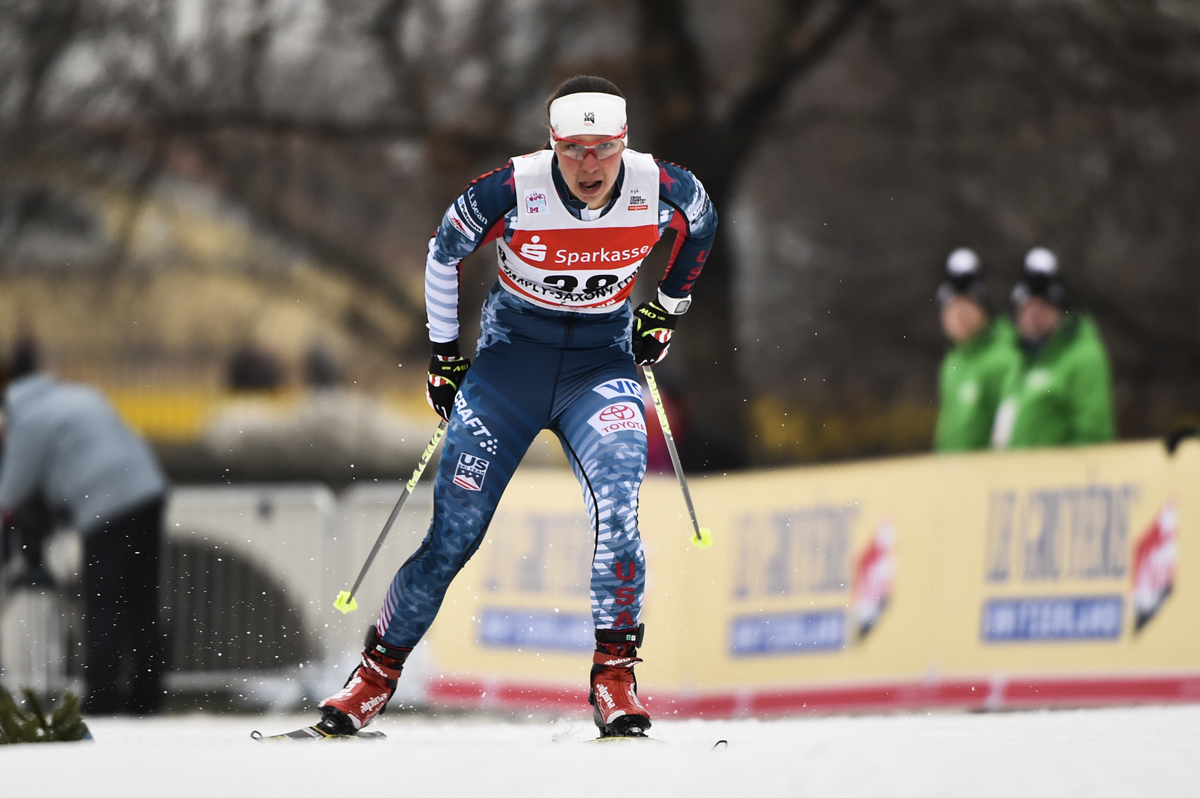
Julia Kern finished 38th (+7.78) and Caitlin Patterson 40th (+8.56).
“We had an uncharacteristically poor qualification,” Grover said. “I have a feeling it was a combination of things… Just over two minutes for women and men a minute fifty, I think that might have been a little bit of a shock to the system. I couldn’t tell if our group was a little flat, or [this race is] just so uncharacteristic, something that we don’t really prepare for because it’s that much more on the anaerobic side instead of a mix of aerobic and anaerobic like we’re used to for a sprint.
“Anyway, to have Erik Bjornsen just miss the qualification, to have Kikkan just miss the qualification, to have the four athletes who did go in not have the best qualifications, something was a little bit missing,” he concluded.
In Sunday’s team sprint, Sargent and Caldwell will team up, with Randall and Patterson forming the second U.S. team in a field of 20 entries.
No Canadian women competed in Dresden.
Results: Women’s qualifier | Women’s heats
— Gabby Naranja and Ian Tovell contributed

Chelsea Little
Chelsea Little is FasterSkier's Editor-At-Large. A former racer at Ford Sayre, Dartmouth College and the Craftsbury Green Racing Project, she is a PhD candidate in aquatic ecology in the @Altermatt_lab at Eawag, the Swiss Federal Institute of Aquatic Science and Technology in Zurich, Switzerland. You can follow her on twitter @ChelskiLittle.

